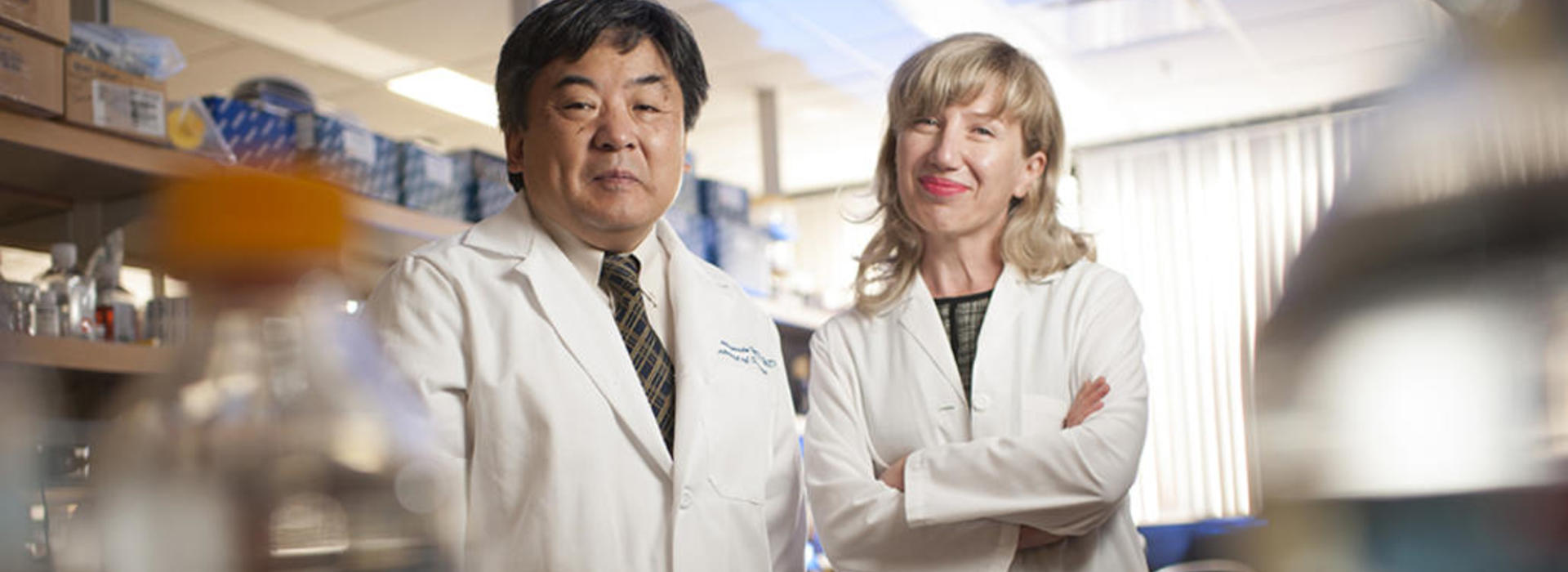
U of M Researchers Using Viruses to Target Cancer Cells
“When we think about viruses, we think disease,” says Masato Yamamoto, M.D., Ph.D., a professor in the Department of Surgery and member of the Masonic Cancer Center, University of Minnesota. “But by wisely using viruses, we can design therapies that target cancer cells.”
We know that viruses cause illness, from the not-so-serious common cold to the potentially deadly influenza, AIDS, and measles. So it seems counterintuitive that scientists would turn to viruses in their search for cancer treatments, but astonishing successes have put the world’s spotlight on oncolytic viruses as the next great hope for cancer treatment.
In Yamamoto’s lab, the main focus is using the adenovirus (common cold virus) to deliver a knockout punch to pancreatic cancer cells.
Julia Davydova, M.D., Ph.D., an assistant professor of surgery who works with Yamamoto, explains how it works: “This is a gene therapy approach, meaning we design special viruses that can deliver a piece of DNA to kill tumors. We use the adenovirus as our [tumor-destroying] agent because it can express the gene of interest at high concentrations specifically in tumor tissues while eliminating cancer cells as a part of viral replication. Besides, adenovirus’ replication machinery has been carefully scrutinized and established, it doesn’t integrate into the genome, it doesn’t cause mutations, and, since it’s a common cold virus, it’s not associated with any severe disease.”
That’s a brief explanation for a process that takes years, in which scientists work to create and then clone powerful, specialized versions of the adenovirus that can home in on cancer cells and destroy them.
Trials in the lab show it works. When mice with malignant pancreatic tumors were given a single intravenous injection of the specially engineered adenovirus, four out of 10 tumors disappeared completely—something Yamamoto calls “an amazingly good result.”
The research is not without challenges, though.
“Our ability to create exciting new viruses greatly outshines our ability to test them in the clinic,” she says. “Each time we modify the virus, it’s considered to be a new drug, so it has to go through the painstaking process of approval. It can take six or seven years, or even longer, to go from cloning the virus in the lab to bringing it into the Phase I clinical trial,” Davydova explains.
Given infinite resources, the teams could push ahead much faster. They are dealing with new viruses that no companies are marketing yet, and insurance companies do not pay for the treatment. This means they have to rely on grants and philanthropy to continue to move forward.
Regardless, scientists are driven to see this through because evidence is growing that oncolytic viruses are, indeed, effective weapons against various types of cancer.
“We’ve had such great achievements with the new generation of adenoviruses,” says Davydova. “The data are very exciting.”
“I see great promise in this,” adds Yamamoto, who hopes to open a clinical trial for people who have pancreatic cancer soon. “Our cancer center is very strong and is committed to enhancing work in this area. With that support, I believe we can design really effective treatments for devastating cancers.”
Masato Yamamoto, M.D., Ph.D. and Julia Davydova, M.D., Ph.D. are conducting crucial research at the University of Minnesota. With the right resources, we can improve cancer prevention, screening, treatment, and survivorship. Learn about the proposed Minnesota Cancer Clinical Trials Network.